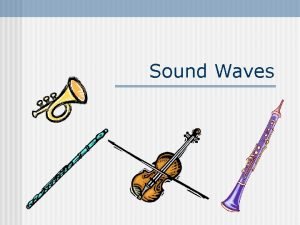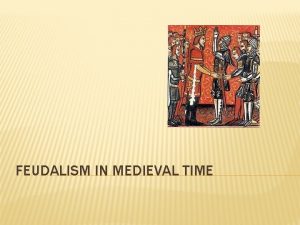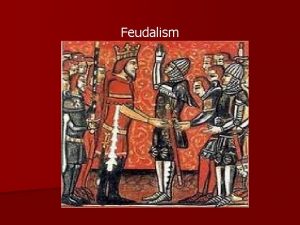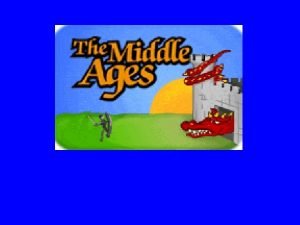Feudalism Social Pyramid EQ What are the different

















- Slides: 17

Feudalism Social Pyramid

EQ: What are the different roles and responsibilities of people in a Feudal Society?

Serfs ● ● ● Not landowners Given some of the lord’s land to tend “Tied to the Land” Some even worked in the household Not slaves Obligated to work a certain amount of time for the lord, and give the lord a percentage of all the crops

Peasants Most people in Middle Ages were peasants Daily Responsibilities ● Worked in Fields-grow vegetables ● Make and clean clothes ● Make bread, and other food ● Raise Livestock-horses, pigs, sheep, goats

Peasants had daily responsibilities Could also live on the lord’s land “rent” it. Would farm land owned by noble, then return home to farm their own small plot

Peasant vs Serf ● Neither were land owners ● Both were responsible for farming the noble’s land ● Serf’s tied to the Noble’s land-not allowed to leave even if there was no Noble ● Peasants could come and go as they pleased.

Knights How to become a Knight Paige-7 yrs old Squire-14 yrs. Knight-21 yrs.

Paige A boy served as a paige from the age of 7 until his teens. During this period he learned to fight with swords, play chess and other games that taught skill and strategy A paige also learned to serve his master and to hunt with falcons and hawks

Squire ● A squire acted as a servant to his master while training to be a knight. ● Squires tested their skills with a lance against targets called a quintrain ● A squire rode beside his master in battle & took charge of prisoners

● A squire might become a knight on the battlefield if he was very brave or at the lords estate or by the king ● “I dub you knight” ● A knight received his sword and armor from his lord or wealthy nobles or the king himself!

Knight

Chivalry ● Idealized Code of Conduct ● Show bravery on battlefield ● Loyalty to lord ● Courteous behavior toward women ● Live an honorable life

Vassal Noble with less power and money Given land by Noble Possible for Knight to become Vassal

Nobles ● Nobles provided work ● land ● protection to the peasants ● Providing funding supplies ● military service to the king.

King/Monarch Above everyone else in Feudal system ● ● ● Pray Pass laws Meetings with Council Hunting Lead Military into battle Protect Kingdom

Manor The main part of an estate or a large country house.

Fill in Pyramid Use this information to complete the Social Hierarchy Pyramid. Include a description And a colorful drawing Noble, King, Serf, Knight, Pope, Peasant, Vassal, Monarch, Lords
 Insidan region jh
Insidan region jh Social pyramid feudalism
Social pyramid feudalism What is the purpose of drawing a social pyramid
What is the purpose of drawing a social pyramid Feudal europe social pyramid
Feudal europe social pyramid Feudal pyramid
Feudal pyramid Feudal pyramid of power
Feudal pyramid of power Feudal pyramid
Feudal pyramid Japanese feudal hierarchy
Japanese feudal hierarchy Social thinking and social influence in psychology
Social thinking and social influence in psychology Social thinking social influence social relations
Social thinking social influence social relations Why do different polymers have different properties
Why do different polymers have different properties Why do different atoms produce different colors
Why do different atoms produce different colors Sound will travel at different speeds in different mediums.
Sound will travel at different speeds in different mediums. Sound travels fastest through
Sound travels fastest through Cultural relarivism
Cultural relarivism Different angle different story
Different angle different story Different faces different places song
Different faces different places song Different materials have different
Different materials have different
































